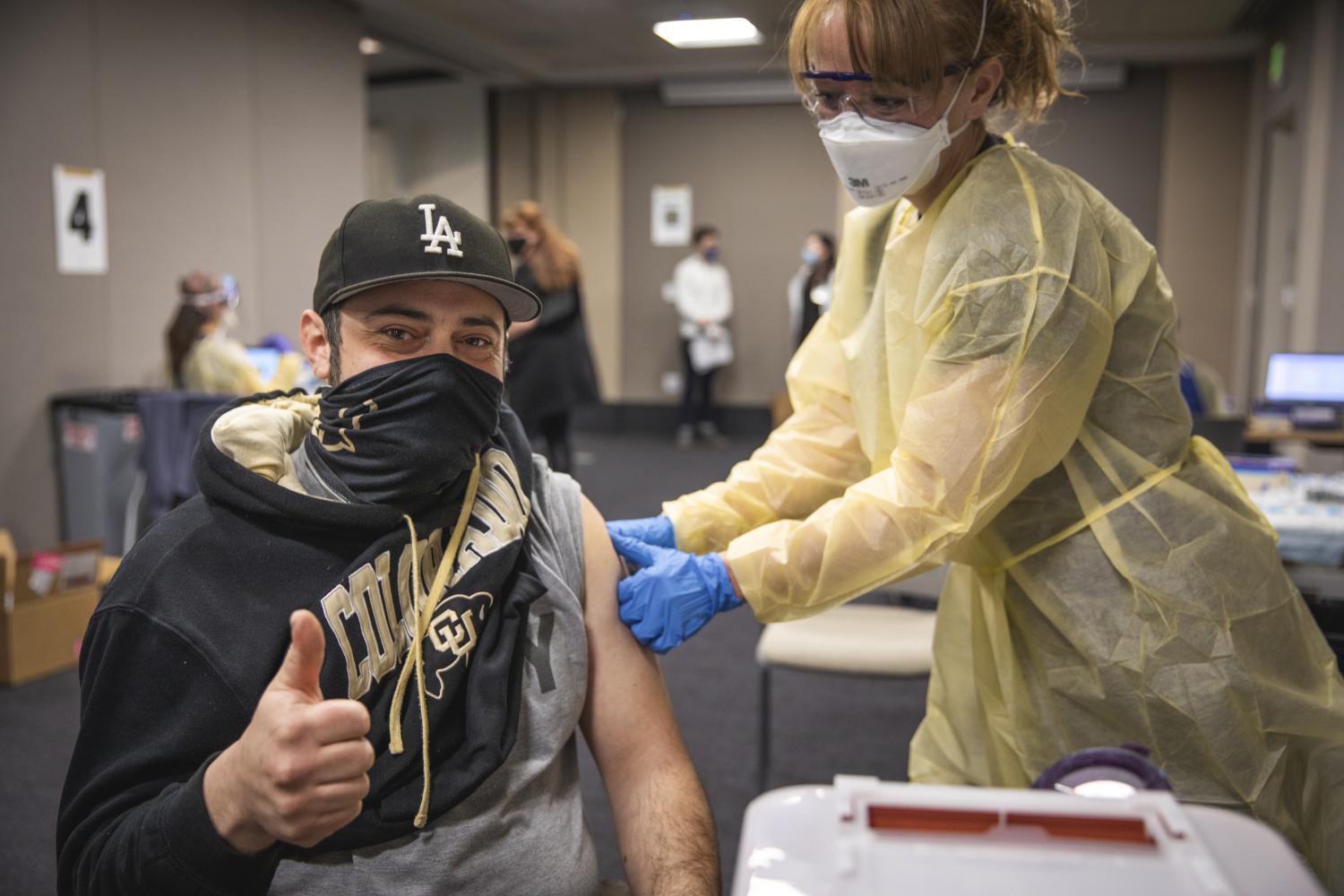Medical Services After-Hours Care
Medical Services has partnered with TimelyCare to offer a cost-free, after-hours medical telehealth service to all CU students. Create your account at timelycare.com/cuboulder to get started.
COVID-19 Vaccination Information

Get the COVID-19 vaccine
Medical Services is providing COVID-19 vaccines to CU Boulder students, staff and faculty. Vaccines are available by appointment at Wardenburg Health Center.
COVID-19 vaccine boosters
COVID-19 vaccine booster shots are available for certain individuals. Use the CDC’s Booster Tool to determine if you are due.
COVID-19 booster appointments
CU affiliated students, faculty and staff who meet the criteria may receive a COVID-19 booster.
Location: Wardenburg Health Services, 2nd floor
FAQs
Why you should get vaccinated
Getting the COVID-19 vaccine is an effective way to protect yourself from getting COVID-19. The current vaccines help protect you by preventing serious illness, hospitalization and death from COVID-19.
Even if you’ve had COVID-19 in the past, it’s important to get vaccinated against the virus. Medical experts are still unsure how long people are protected from reinfection after recovering from the virus. Getting the vaccine and continuing to follow public health guidelines is the best way to protect yourself from becoming infected again.
Who should get vaccinated

The CDC now recommends COVID-19 vaccination for everyone 6 months of age and older.
People who are moderately or severely immunocompromised have specific COVID-19 vaccine recommendations, including recommendations for a booster. Learn more about COVID-19 vaccine recommendations for people who are moderately or severely immunocompromised.
The following COVID-19 vaccine and booster recommendations may be updated as CDC continues to follow data related to vaccine effectiveness and safety, waning immunity, and protection against variants.
Vaccine Safety
Since the beginning of 2021, more than 270 million people in the United States have been fully vaccinated against COVID-19. As part of the vaccine rollout, organizations like the Center for Disease Control and Prevention (CDC) have ensured the safety of recipients by providing the most thorough safety monitoring in U.S. history.
If you’ve recently tested positive for COVID-19, are experiencing symptoms or are in isolation, you should wait until you complete your isolation and are no longer experiencing symptoms before getting vaccinated.
COVID-19 vaccines are safe.
Each of the approved vaccines was evaluated through clinical trials and met the Food and Drug Administration (FDA) standards for safety, effectiveness and manufacturing quality that are required for emergency use authorization (EUA) status.
You cannot get COVID-19 from the vaccine.
None of the authorized COVID-19 vaccines in the United States contain live virus. This means that the vaccines cannot infect you with COVID-19, and you will not test positive for a viral test. It is important to remember that if your body develops an immune response, there is a possibility you may test positive for some antibody tests. A positive antibody test does not mean they are currently infected.
Side effects are mild and temporary.
Many people do not experience side effects after vaccination. If you do experience side effects, they are usually mild and go away within a few days. Common vaccine side effects include:
- Pain or swelling at the injection site
- Chills
- Headache
- Tiredness
- Fever
It’s important to remember that side effects are normal and show that your immune system is building up protection against the virus.
Pregnancy
Anyone who is pregnant or planning to become pregnant can receive the COVID-19 vaccine when it becomes available to them. There is currently no evidence that antibodies formed from the vaccine cause any problems with pregnancy, including the development of the placenta. Learn more about vaccination considerations for people who are pregnant or breastfeeding.
Allergies
A severe allergic reaction to the vaccine is extremely rare. A small number of people (roughly 1 in 100,000) have had severe allergic reactions after the vaccine. After you receive a COVID-19 vaccine, you will be asked to stay for 15-30 minutes for observation in case of severe allergic reaction. If a severe allergic reaction occurs, our health care staff have medications available for immediate treatment. Learn more about CDC guidelines around allergies and the COVID-19 vaccines.
If you are allergic to other types of vaccines
If you’ve had an immediate allergic reaction (even if it was not severe) to another vaccine or injectable therapy, ask your healthcare provider if you should get a COVID-19 vaccine. Your healthcare provider can help you determine if it is safe to get vaccinated.
If you have allergies not related to vaccines
The CDC recommends getting vaccinated even if you have a history of severe allergic reactions not related to vaccines or other injectable medications, including food, pet, venom, environmental and latex allergies. People with a personal or family history of allergies to oral medications may also get vaccinated.
How vaccines work
[video:www.youtube.com/watch?v=jWarRTq0HtI]
[video:www.youtube.com/watch?v=PKBH0Wa7u6A]
[video:www.youtube.com/watch?v=pDRq_lOXIzE]
Questions and concerns
If you have any questions about COVID-19 or the COVID-19 vaccines, please contact Buff Info. The Buff Info team is available to answer questions on a wide variety of topics related to CU Boulder and help faculty, staff, students and parents connect with the appropriate campus office for additional information or assistance as needed.
They are available Monday through Friday from 9 a.m. to 6 p.m. The university will extend these hours as needed.



